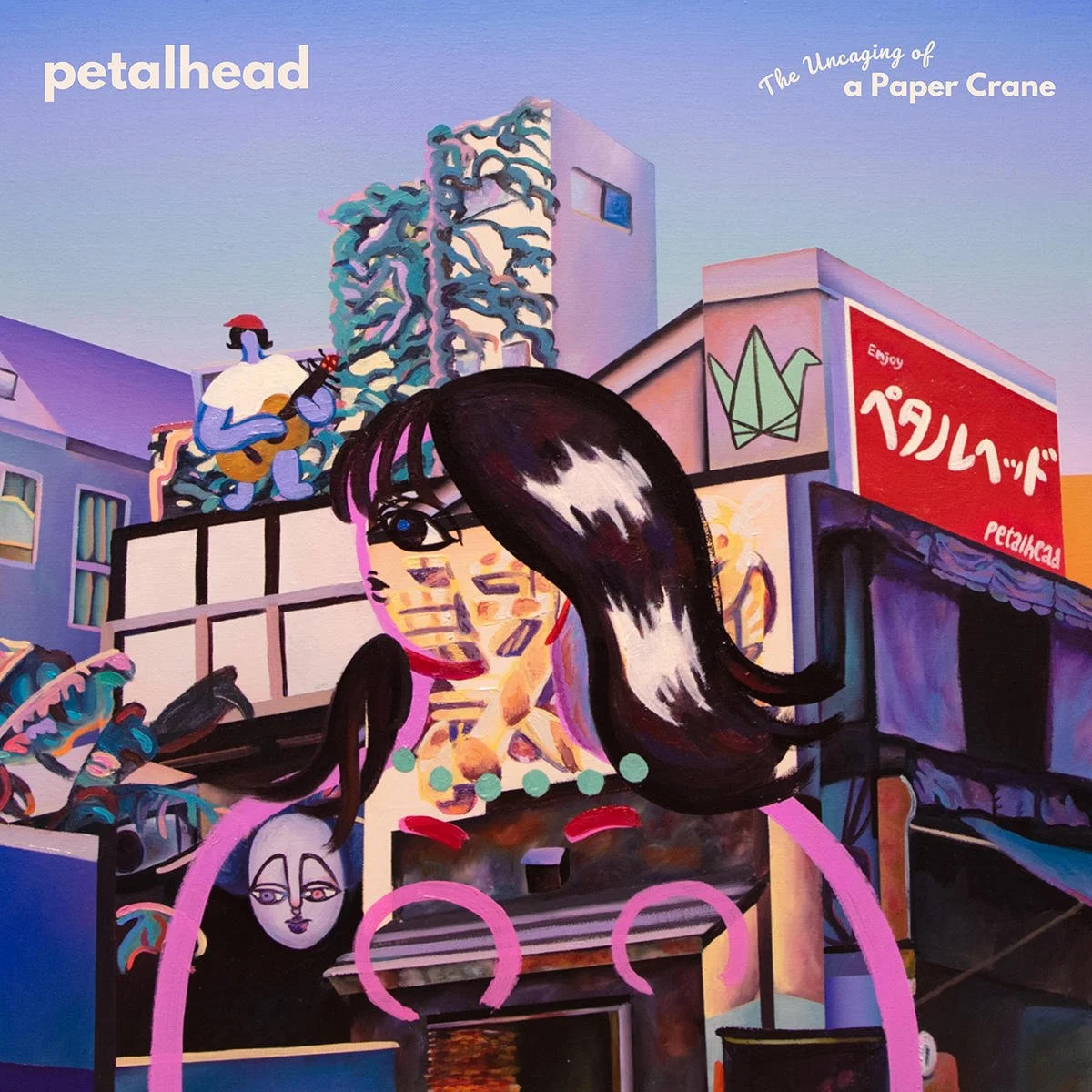petalhead - The Uncaging of a Paper Crane
Full of light and whimsy, “The Uncaging of a Paper Crane”, the long-awaited first full album from Tokyo-based band petalhead, serves up a delightful platter of well-crafted songs that reflect their diverse tastes ranging from folk and city pop to bossa nova and rock, providing a brief but welcome respite from the harsh realities we face today.
What started as a bedroom-studio project is now a two-person musical unit consisting of lyricist / lead singer Jaime Alise and guitarist Riku Ogura. Describing their music as “experimental pop”, they are primarily influenced by music of the 70’s that combines analog warmth, rich studio instrumentation, and the incorporation of emerging digital technology of the times. This actually means they have more in common with bands of the 80’s/90’s who grew up on that kind of music like the Cranberries, Belinda Carlisle, or Fleetwood Mac.
As an older listener myself, that makes the petalhead catalog instantly familiar in terms of songwriting and feel, but given that this is 2025, it’s as if petalhead have a time machine and are performing amongst their peers in the early 90’s. What gives them away are anachronisms for that era, not just in the modern production techniques but also in the fact that Jaime is switching smoothly between Japanese and English. That combination of classic sounds and multilingual lyrics would have been extremely rare, imagine hearing Dolores O’Riordan splicing in Japanese for foreign audiences before the widespread acceptance of anime or Asian pop, or Taeko Onuki singing in perfect English for the insular Japanese music market. Yet here we are.
At the same time, neither member fits the rock star archetype, both are rather private and introspective. As such, releasing a full album itself is something of a calculated risk, a peek into their inner world. Naturally, the songs are carefully worked and contain intricate details, this is not a jam band that creates spontaneously based on riffs, loops, or samples. The band itself consists of two very different individuals with different skill sets - neither is a solo artist and therefore relies on the other to create this sound. So part of this album has been a journey of self discovery, to find out what they are capable of and show it to the world.
One of the key themes of the album is exploration. Not just in sound, be it the exploration of different genres such as bossa nova (オレンジの帰り道), traditional Japanese pop (果実の好きなだけ), or city pop (Gamekeeper), but within the songs themselves. Lyrically and melodically, petalhead songs tend to meander and unfold over the length of the song, rising and falling gently. It often feels like you’re being taken on a journey, there’s rarely repetition of a single note that you might normally find in a power pop chorus. They also employ modulations strategically, similar to the songwriters of yesteryear, that allow them to immediately shift the mood of a song. These shifts are further enhanced by changes in language, particularly on “Springs to Life”, where they’re getting ready for a home party, and as they introduce what’s going to happen (“my friends and all your friends, we’ll come together and delight in sounds”), the song then shifts up for the bridge where Jaime describes the scene in Japanese: a moonlit night, dancing until morning under the stars. While it’s not strictly revolutionary, it's ironically an anachronism in modern songwriting (other than truck driver gear shifts). Meanwhile, on “Kakera”, petalhead take you on a lyrical journey, from footsteps on the crossing and stoplights on the concrete of the city, to imagining fields of poppies and sounds filling the skies, followed by a guitar solo which places you back into the verse and reality. As a reflection of their professional chemistry, it’s the perfect baton touch between the words and the guitar, taking you effortlessly from one place to another.
The other key theme is release. Of course, it’s all told through imagery and metaphors, but it’s something of an allegory for the band itself, who has held all these emotions and ideas inside and has finally put them in a form for the world to hear. On “果実の好きなだけ”, it is likened to an old fruit tree that has absorbed the sunlight and nutrients to provide a near unlimited harvest, while on “Hadakagi” it is how “gently her hands unfold the years before and afterwards”, hinting at unpacking memories and future experiences, “like the uncaging of a paper crane, her fragile wings are freed from strain”, letting creation take flight. However, release is also expressed in other ways, be it a form of surrender to love (Lightness), or to death and beyond (Kagemade). And on “Ghost on Holiday”, it comes through the composition, where the song builds up to the tops of the all giving tree for a beautiful view and then Riku’s guitar plays a gently descending melody that floats you to the ground.
Due to this dedication to intentional songcraft and care, “The Uncaging of a Paper Crane” has been a long time coming, and you can hear that it’s been worth the wait. Petalhead have deftly drawn on the sounds of the past and put their own spin on it, rather than becoming a mere imitation of their favorite genres. There’s so much detail and beauty in the composition, there’s variation in style, and the poetic approach to the lyrics leaves plenty of mysteries to ponder upon repeated listens. Uncaged at last, this (paper) bird has flown.
Tokyo ON also recommends: CHiLi GiRL - MEBAE, Sato Moka - Glints
